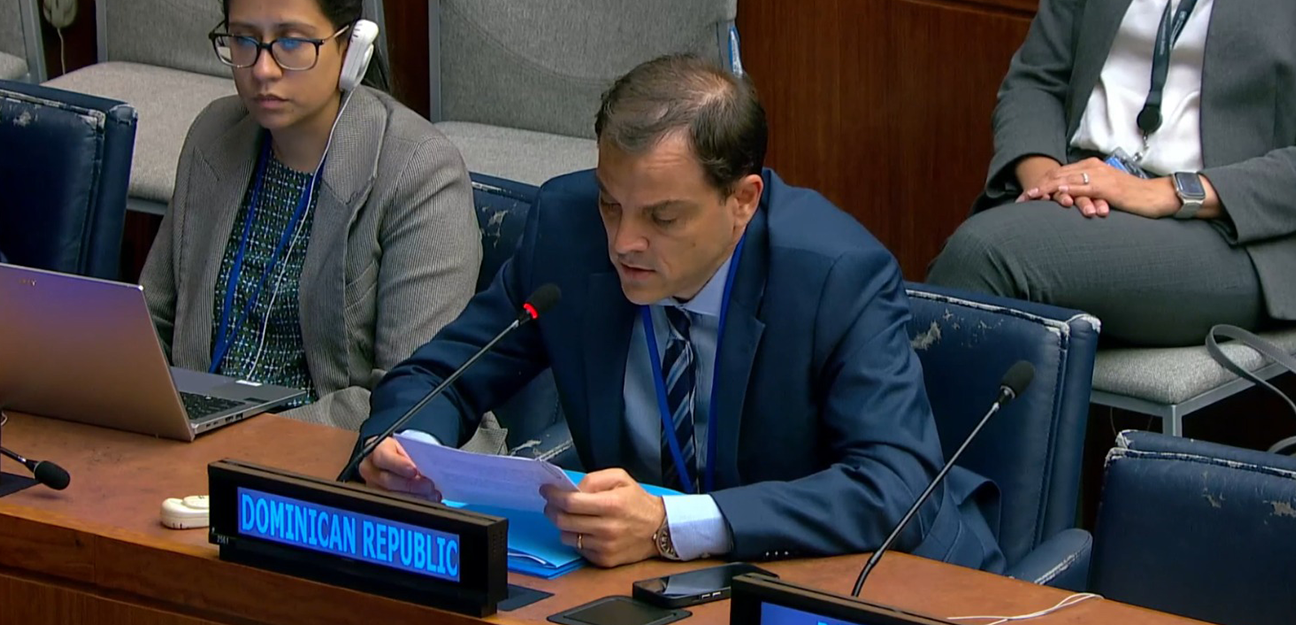Joint Statement Delivered by Martín Francos Vice-Minister of Planning and Public Investment

Distinguished delegates,
I have the honor to deliver this joint statement on behalf of the delegations of Antigua and Barbuda, Barbados, Belize, Colombia, Costa Rica, Cuba, Guatemala, Guadalupe, Honduras, Mexico, Panamá, Saint Lucia, Saint Kitts and Nevis, which are members of the Association of Caribbean States, and my own country, the Dominican Republic.
The sargassum phenomenon, though natural in origin, has reached an unprecedented scale and frequency due to factors linked to climate change, nutrient pollution, and disruptions in ocean current circulation. Its impacts jeopardize the ecological balance of marine environments, cause serious public health risks, and place socio-economic pressures on coastal communities.
In several regions, especially in the Greater Caribbean, massive sargassum influxes directly affect critical economic activities such as tourism and fisheries, raising serious concerns about food security and the livelihoods of thousands of families that depend directly or indirectly on these economic activities. Moreover, the decomposition of sargassum along coastlines produces harmful gases that threaten human health and contribute to the degradation of vital marine ecosystems, including coral reefs and seagrass beds.
This phenomenon represents a growing and direct threat to achieving the commitments under Sustainable Development Goal 14: Life Below Water, as well as related goals on health, decent work, climate action, and economic growth.
We must not lose sight of sargassum as a transboundary issue. Its scale and nature make it a structural regional challenge disproportionately affecting Small Island Developing States (SIDS).
We can develop effective, resilient, and long-term mitigation and adaptation strategies to address this crisis only through collective, sustained, and solidarity-based action grounded in regional and international cooperation.
In this regard, we call for the sargassum crisis to be given greater visibility and priority within the multilateral system. Strengthening cooperation mechanisms is urgent to expand scientific knowledge, improve monitoring, early warning, and management capacities, and promote the exchange of experiences and technologies for their responsible and sustainable use.
Likewise, it is essential to advance the design and promotion of accessible and inclusive financial and technical mechanisms for the most affected States, enabling them to implement comprehensive environmental, social, and productive responses that protect both marine ecosystems and the livelihoods of coastal populations.
Mr. President,
The transboundary nature of this phenomenon requires shared solutions guided by science, equity, and the principle of common but differentiated responsibilities. We must recognize sargassum not only as a local issue, but as a regional and global matter that affects sustainable development in its three dimensions: economic, social, and environmental across the region and the world. It also represents a unique opportunity for its potential use as an alternative energy source, biofuel, agricultural fertilizer, bioplastic, and other innovative bio-based materials.
We emphasize the need for this issue to be addressed with the urgency and seriousness it warrants to preserve the health of our oceans for present and future generations.
Thank you.
Related Speeches
STATEMENT BY H.E. AMBASSADOR NOEMÍ ESPINOZA MADRID, SECRETARY-GENERAL, ON THE OCCASION OF THE HIGH-LEVEL RECEPTION FOR THE OFFICIAL LAUNCH OF THE GREATER CARIBBEAN CLIMATE MOBILITY REPORT DURING THE 3RD CLIMATE MOBILITY SUMMIT
Excellencies,
Distinguished delegates,
Ladies and gentlemen,
STATEMENT BY H.E. AMBASSADOR NOEMÍ ESPINOZA MADRID, SECRETARY-GENERAL, ON THE OCCASION OF THE ASSOCIATION OF CARIBBEAN STATES HIGH-LEVEL BREAKFAST OF CLIMATE MOBILITY CHAMPIONS: “HARNESSING CLIMATE MOBILITY FOR ADAPTATION AND RESILIENCE”
Excellencies,
H.E. Prime Minister Feleti Teo of Tuvalu
H.E. Prime Minister Terrance Drew of Saint Kitts and Nevis
H.E. Prime Minister Américo d'Oliveira dos Ramos of Sao Tome and Principe
STATEMENT BY H.E. AMBASSADOR NOEMÍ ESPINOZA MADRID, SECRETARY-GENERAL, ON THE OCCASION OF THE ASSOCIATION OF CARIBBEAN STATES HIGH-LEVEL BREAKFAST OF CLIMATE MOBILITY CHAMPIONS: “HARNESSING CLIMATE MOBILITY FOR ADAPTATION AND RESILIENCE”
Excellencies,
H.E. Prime Minister Feleti Teo of Tuvalu
H.E. Prime Minister Terrance Drew of Saint Kitts and Nevis
H.E. Prime Minister Américo d'Oliveira dos Ramos of Sao Tome and Principe




